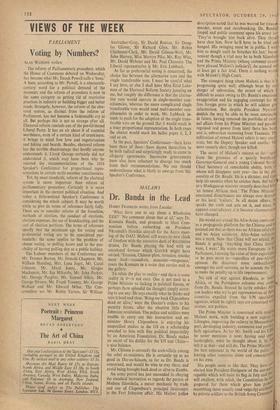VIEWS OF THE WEEK
PARLIAMENT
Voting by Numbers?
ALAN WATKINS writes:
The reform of Parliamentary procedure, which the House of Commons debated on Wednesday, has become what Mr. Enoch Powell calls a 'hum.' A hum, according to Mr. Powell, is a nineteenth- century word for a political demand of the moment; and the reform of procedure is now in the same category as getting rid of restrictive practices in industry or building bigger and better roads. Strangely, however, the reform of the elec- toral system, as distinct from the reform of Parliament, has not become a fashionable cry at all. But perhaps this is not so strange after all. Electoral reform reminds one of the pre-Grimond Liberal Party. It has an air about it of essential worthiness, even of a certain kind of crankiness; it brings to mind free love and vegetarianism and hiking and beards. Besides, electoral reform has the terrible disadvantage that hardly anyone understands it. Lloyd George certainly did not understand it, which may have been why he rejected the recommendations of the 1916 Speaker's Conference for proportional repre- sentations in certain multi-member constituences.
Yet, by most standards, reform of the electoral system is more important than reform of parliamentary procedure. Certainly it is more important in the current political situation. And today a little-noticed Speaker's Conference is considering the whole subject. It may be worth while to give its terms of reference fairly fully. These are to consider reform of the franchise, methods of election, the conduct of elections, election expenses, the use of broadcasting, and the cost of election petitions. The terms of reference • specify that the minimum age for voting and preferential voting are to be considered par- ticularly; the same applies to the problem of absent voting, to polling hours and to the pos- sibility of having polling day as a public holiday.
The Labour members of the Conference are Mr. Terence Boston, Mr. Donald Chapman, Mr. William Handing, Mrs. Lena Jeger, Mr. Carol Johnson, Mr. Idwal Jones, Mr. Gregor Mackenzie, Mr. Ian Mikardo, Mr. John Parker, Mr. George Pargiter, Mr. Samuel Silkin, Mr. George Strauss, Mr. Frank Tomney, Mr. George Wallace and Mr. Edward Milne. The Con- servatives are Mr. Robin Turton, Sir William Anstruther-Gray, Sir David Renton, Sir Doug- las Glover, Sir Richard Glyn, Mr, Robin Chichester-Clark, Mr. David Gibson-Watt, Mr. John Harvey, Miss Mervyn Pike, Mr. Roy Wise, Mr. David Webster and Mr. Paul Channon. The Liberal representative is Mr. Eric Lubbock.
As far as preferential voting is concerned, the choice lies between the alternative vote and the single transferable vote. I must be careful what I say here, or else I shall have Miss Enid Lake- man of the Electoral Reform Society jumping on me, but roughly the difference is that the alterna- tive vote would operate in single-member con- stituencies, whereas the more complicated single transferable vote would need multi-member con- stituencies in order to work. Mr. Lubbock in- tends to push for the adoption of the single trans- ferable vote on the ground that it would result in a truer proportional representation. In both cases the elector would mark his ballot paper 1, 2, 3 and so on.
In the past, Speakers' Conferences—there have been three of these—have shown themselves to be both radical and surprisingly ready to come to all-party agreements. Successive governments have also, been reluctant to diverge too much from their recommendations. No one should underestimate what is likely to emerge from this Speaker's Conference.






































 Previous page
Previous page